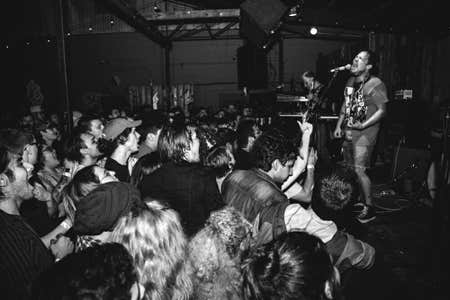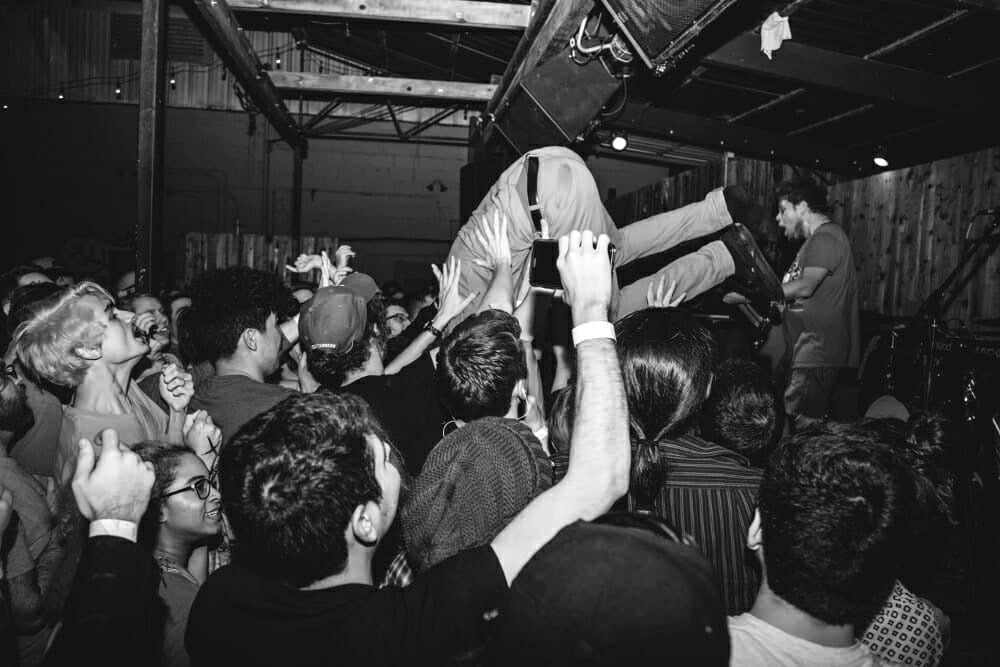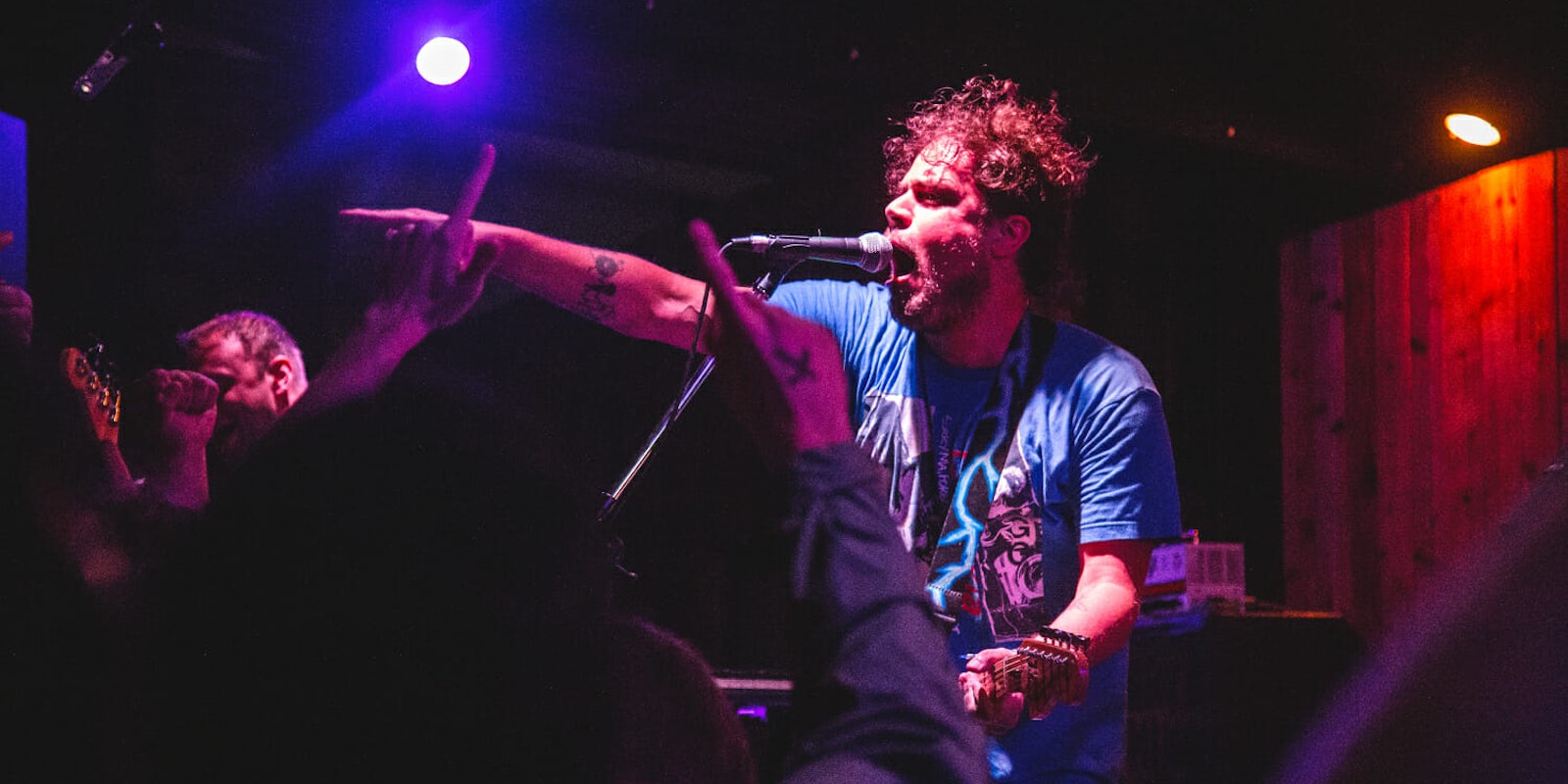It starts quietly, and then it explodes all at once.
“It doesn’t exist, it doesn’t exist,” Jeff Rosenstock sings on the chorus of “Perfect Sound Whatever,” exhorting the sold-out crowd at Austin, Texas’ Barracuda to join him. The band revs behind him as each refrain gets louder, and soon the frontman is screaming at the top of his lungs, sweat pouring down his face as he wrings power chords from his guitar. The audience rushes the stage as the band members jump so furiously they threaten to stomp holes in the floorboards.
And then, as suddenly as it began, it’s over.
Rosenstock is opening for Scranton, Pennsylvania, blue-collar punks the Menzingers. The Barracuda gig marks his second sold-out Austin show since releasing WORRY.—a genre-spanning tour de force of anxiety and adrenaline—last October. Between the new record and its predecessor, We Cool?, the Brooklyn punk luminary has been riding a two-year creative and commercial high, even as he approaches two decades in the music industry.
https://www.youtube.com/watch?v=YupZAfiGnH8
As a teenager, Rosenstock helmed ska-punk sextet the Arrogant Sons of Bitches, releasing three albums and two EPs before disbanding in 2006. The previous year, he holed up in his bedroom and recorded a slew of songs on his laptop under the moniker Bomb the Music Industry!. The ensuing release, Album Minus Band, boasted the tagline: “Unlicensed cover songs. Unlicensed audio samples. Great times.”
The newly liberated solo artist released Album Minus Band through Quote Unquote Records, a donation-based online label that he founded and ran as an antidote to outrageous CD prices.
“Nobody was buying CDs at that point,” he tells the Daily Dot. “When CDs cost $18.99 for a record that had no artwork to speak of, and the songs were mostly bad, it was just like ‘Yeah, I’d rather just go on Napster and get this.’”
Album Minus Band employed a strategy that Radiohead would use two years later for its seventh full-length, In Rainbows. Released online at a pay-what-you-want scale, the record debuted atop the Billboard chart and redefined the relationship between artist and consumer—a fact not lost on Rosenstock.
“I don’t know, have you heard this OK Computer record?” he says with a laugh. “That was pretty big before [Radiohead] did the free music thing. So they had a lot to rest on in case it went wrong, and had also proven themselves. I feel like I was always, even still, trying to prove myself. Like, ‘Hey, no, I’m a person that makes music. Maybe listen to it? I know it’s dumb, but it’s still good.’”

It worked for a while, but Rosenstock struggled to convince bookers to work with a completely independent band. Mentally, emotionally, and financially drained and longing to explore other avenues, Bomb the Music Industry! shuttered in early 2014.
Around that time, the frontman started demoing We Cool? and caught the attention of veteran indie label SideOneDummy Records. The two quickly established common ground, and SideOneDummy signed Rosenstock while still allowing him to release records for free on Quote Unquote.
Rosenstock, a self-proclaimed control freak, was leery to work with a label for the first time in his life.
“I think about the 16-year-old punk kid in me who would have been mad at me for doing this,” he says. “I don’t want to let anyone down. That would kill me, if somebody felt like they were cheated by something I had said or something that we had done.”
Rather than alienate the fanbase that exalted him as a DIY hero, however, signing with SideOneDummy offered Rosenstock the resources to make the best music of his career. Over 17 songs and 37 minutes, WORRY. grazes power pop, ska, hardcore, and epic balladry, juxtaposing the triumphs of Rosenstock’s personal life—his recent marriage and increased musical success—with the horrors of the world around him.
“I feel like you look at the news and you see just absolutely horrific things happening, with police shooting unarmed black people and it being on tape and stuff like that,” he says. “And you walk around your city and you see people getting pushed out of their homes, and you see luxury high rises going up. And with all that going on, it’s kind of hard to imagine that the world that you live in is a place that also fosters love and kindness. So I think that’s how that record ended up being the way it was. Just the fight to still have empathy and compassion in a world that is teaching you to not do that, basically. Which is a heavy thing, so I put a ska song on there.”
One piece of Rosenstock’s merchandise symbolizes the lyrical themes on his new record with disarming accuracy: a black-and-white sticker of a scowling President Trump with “worry” scribbled underneath.
“I liked the idea of having reverse propaganda that’s trying to coax people into being aware, instead of trying to trick people into ignoring things,” he says. “We didn’t make any more of them, because it was just like, well, it’s kind past the point of worrying about that guy. But before, when everybody was like, ‘Oh, there’s no way,’ it was kind of like, ‘No, there’s a way. Fucking don’t think that there’s not.’”
Indeed, there was a way—and now Rosenstock is one of many musicians coming to grips with living in the U.S.
“It’s gonna be really funny this year to have a bunch of fucking overt political punk records after it’s kind of too late,” he says with a bitter laugh. “People were saying, like, ‘Yeah, punk’s gonna be good again!’ It’s like, yeah, also people are gonna get kicked out of our country who have lived here for 20 years. So maybe, punk being good again—fuck you, who cares?”

Yet it’s not the job of one person to shoulder that burden alone. Rosenstock can only do his part, whether it’s speaking out against sexual assault at shows or giving kids a chance to jump and scream and escape reality for 60 minutes on a Thursday night. In the meantime, he seems determined to cling to the good things in his own life—the love amid the hate, the joy amid the heartache, the calm amidst the worry.
“My natural state of contentment is chaos,” he says. “I’m never just kicking back like, ‘Yep, I fucking did it.’ But I feel really lucky that we’ve been able to do the tours that we have done, and I don’t take it for granted at all. And if I do catch myself taking it for granted, I try to catch myself, like, ‘Hold on a second. This is awesome, you’re still doing it.’”
Just as he sang onstage at Barracuda: “Perfect always takes so long, because it don’t exist. It doesn’t exist.”


